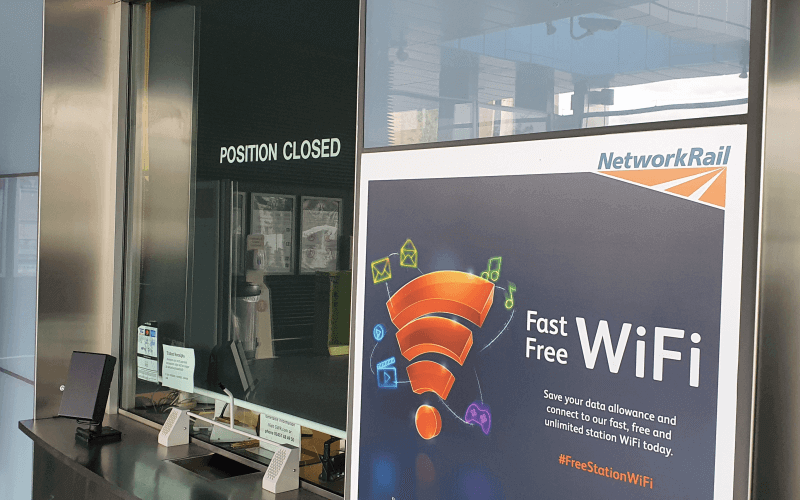The information commissioner has backed the government’s refusal to release its assessment of how plans to close nearly 1,000 ticket offices across England would have affected disabled people and other groups protected under the Equality Act.
The Information Commissioner’s Office ruled that it was still too soon to release the document, even though the proposals have been abandoned.
Disability News Service (DNS) wrote to the Department for Transport (DfT) in November to ask for the equality impact assessment (EIA) to be released.
It was later forced to complain to the information commissioner when DfT refused to release the EIA.
DNS argued that the government’s explanation for refusing to release the assessment – that it might be used to help draw up a government policy decision on the closures – no longer applied as the decision had been made.
But DfT said that, at the time DNS made the request, it was still considering whether to take forward “many of the actions intended to mitigate the impact of ticket office closures”, even if the closures themselves had been abandoned.
And it said ministers and civil servants needed “a safe space away from public scrutiny to formulate and develop policy”, while train operating companies needed to ensure that information “was not prematurely shared” because it would probably have “resulted in negative impacts” on being able to deliver reforms that would benefit passengers and “generate efficiencies benefitting the taxpayer”.
DNS argued that it could take months or even years before DfT’s policy on rail station reform had been settled and it was vital that disabled people could see the EIA so they could make a judgement on how future reforms could affect them.
And it told the commissioner: “The interests of disabled people in being able to access public transport far outweigh the mild difficulties this might cause DfT and the rail companies.”
In his decision notice, the information commissioner said the release of the EIA would have shown “what risks DfT had identified from changes to ticket offices and how it intended to mitigate those risks”.
But he concluded that the consultation process, the EIAs produced by the train companies – which have been published – and other research data “adequately met the public interest”, so there “remained enough weight in the need for a safe space when this request was made”.
The disabled-led campaigning organisation Transport for All (TfA), which failed in an earlier attempt to secure the EIA, said this week: “We find it frustrating and concerning that, even months after the policy has been overturned, the government is continuing to withhold its analysis of how ticket office closures would impact disabled people.
“Our community deserves to know how any potential rail reforms are going to affect us and how we have been accounted for in these decisions.
“If the ticket office scandal should have taught the government one thing, it is that trying to bypass disabled people will inevitably backfire.
“We hope that decision-makers will heed this lesson and increase their transparency and engagement, so as not to repeat the same disastrous mistake.”
Meanwhile, the Office of Rail and Road (ORR) has found that disabled rail passengers would be more likely to complain about rail travel if they felt it was worth their time and energy and would lead to change.
Of those who took part in the ORR research, 46 per cent said they experienced some barriers with the complaints processes of train companies and eight per cent found the complaints process to be inaccessible.
The regulator will now be writing to 10 operating companies that failed to comply with specific requirements in the complaints code of practice and the accessible travel policy guidance that are designed to secure passenger awareness and ensure that complaints processes are accessible to all disabled people.
Tony Jennings, co-chair of a rail accessibility panel and co-founder of the Campaign for Level Boarding, has written to John Larkinson, ORR’s chief executive, following the report’s publication.
He said in the email that he welcomed the report, but that ORR needed to ensure that rail operators learn from their mistakes through enforcement because “the same passenger assistance failures are regrettably repeated by operators time and time again.
“Operators must proactively enforce and implement processes to address and understand the underlying reasons for the failed assistance occurring to help prevent it happening again.”
He said: “If disabled people are to have confidence that their energy expended in complaining is worthwhile, they need to see change and improvements to passenger assistance and feel they are being listened to rather than a tick box exercise.”
He said it was “critical lessons are learned when complaints are made by disabled people”.
A note from the editor:
Please consider making a voluntary financial contribution to support the work of DNS and allow it to continue producing independent, carefully-researched news stories that focus on the lives and rights of disabled people and their user-led organisations.
Please do not contribute if you cannot afford to do so, and please note that DNS is not a charity. It is run and owned by disabled journalist John Pring and has been from its launch in April 2009.
Thank you for anything you can do to support the work of DNS…

 Making all self-driving pilot schemes accessible would be ‘counter-productive’ and slow us down, says minister
Making all self-driving pilot schemes accessible would be ‘counter-productive’ and slow us down, says minister Tribunal allows DWP to continue to hide information from secret reviews into universal credit deaths
Tribunal allows DWP to continue to hide information from secret reviews into universal credit deaths Government’s ‘weak’ response to damning transport access report puts right to travel in ‘grave danger’
Government’s ‘weak’ response to damning transport access report puts right to travel in ‘grave danger’